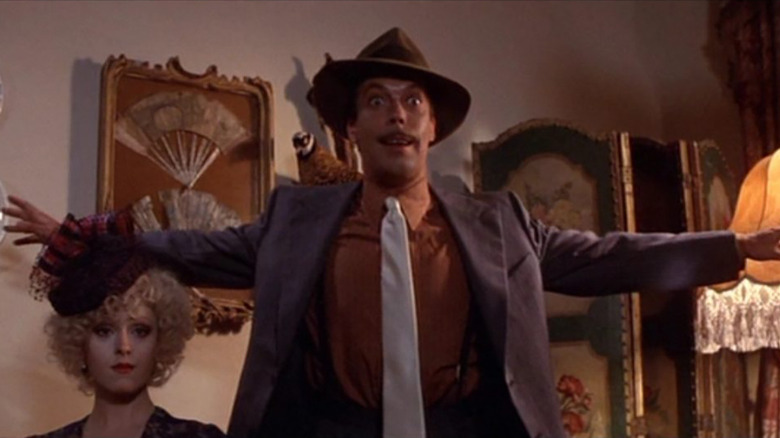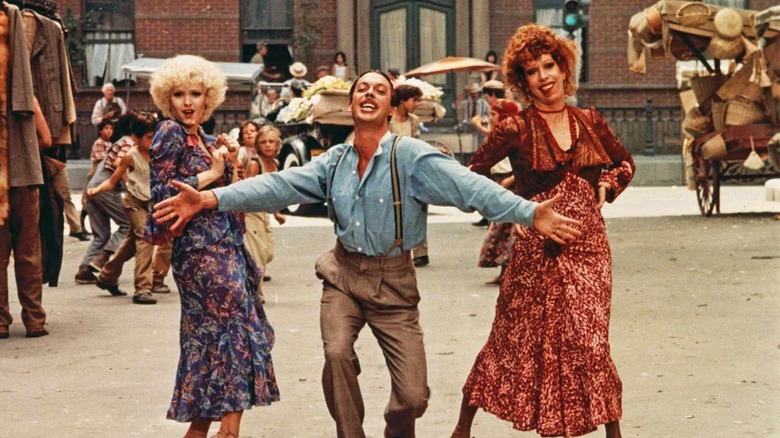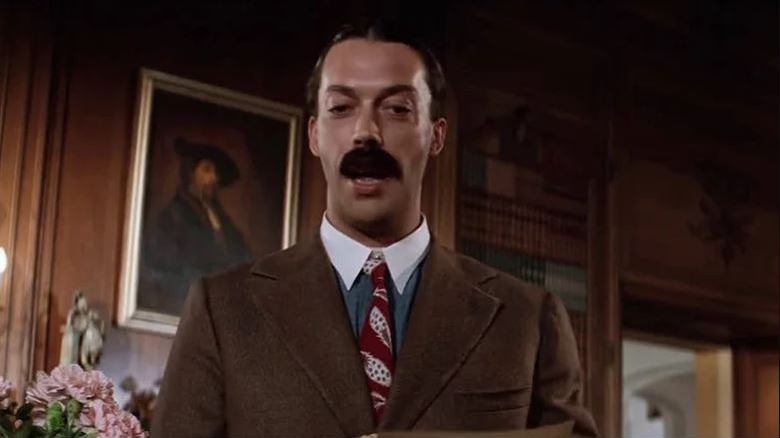John Huston Gave Tim Curry Free Reign To Craft His Annie Character
The musical "Annie" has a special place in my heart that sparks joy. In that same vein, Tim Curry has a special place in my heart that inspires fear. Picture six-year-old me hearing Tim Curry's Rooster Hannigan and running away from the VCR screaming because I recognized the voice of Pennywise in Stephen King's "It." Childhood traumas aside, the man did great work at capturing that rapscallion energy that Daniel Francis "Rooster" Hannigan is supposed to have in the 1982 film version of "Annie."
For those unfamiliar, the character of Rooster Hannigan is a con artist, usually played with a level of charm and sleaze that — especially in a theatrical setting — can be easily perceived in the nosebleed seats. In "Annie," Curry as Rooster worked alongside Broadway legend Bernadette Peters, who portrayed the ditzy blonde character, Lily St. Regis, and the incomparable comedic mastermind, Carol Burnett, who played the ever-grouchy, orphan-hating Miss Hannigan. Together, all three are dynamite to see perform with one another, with each delivering exactly what their respective roles required.
That said, while the characters they portrayed onscreen match the vibe of what you'd want from a stage production of "Annie," the actors weren't heavily restricted in how they were allowed to approach their roles. For Curry, the experience of working on the character was a blast, and a huge part of this is likely due to being given free rein by director John Huston to approach the character however he wanted. Clearly, based on memories, that freedom paid off.
Playing from the rulebook
Tim Curry himself wasn't a stranger to the musical genre before boarding the film project, having first gotten his first full-time role in the Broadway musical "Hair" before hopping onto the stage production of "The Rocky Horror Show" as Dr. Frank-N-Furter. While he believed the role itself almost ruined his career after the film production of "The Rocky Horror Picture Show" was released, plenty of work got thrown his way, which included the film adaptation of "Annie."
In a 2020 interview with Forbes, Curry and his former co-star, Carol Burnett, chatted about their experiences working on "Annie." Curry himself described what it was like to portray the character and work alongside both Burnett and Peters since almost all of their scenes were together. "Rooster was a hustler, and people love that kind of character," Curry shared. "He was a lot of fun. I approached it very much in my way, but the three of us were very close. We were like The Three Musketeers. Carol is, of course, a legend and probably the funniest woman alive."
Burnett added: "The chemistry was there right from the beginning, and John was very good about letting us go with it. He believed that you hire a person because of what they can bring to the movie, so you don't try to tell them how to do it."
Huston's flexibility with his actors was a great benefit and allowed Curry to pull inspiration from other places to construct his version of Rooster.
Mozart & the Rooster
While taking on the production of "Annie," Tim Curry was also performing in the original Broadway production of "Amadeus," where he portrayed the role of the famous composer, Wolfgang Amadeus Mozart. Juggling the two projects meant that Curry had to think on his feet about tackling Rooster. Thankfully, John Huston was open to his suggestions on his approach, explained Curry to Forbes, which involved borrowing from someone he was working with at the time:
"When I met with the director, John Huston, I told him that I was going to borrow the physical characteristics of a stagehand that I was working with on Broadway. I was doing the play, Amadeus. I was playing Mozart the whole time that we were shooting in New York. John trusted his actors, and I admired him enormously. He'd been in the film business for what seemed like forever."
The characterization of Rooster as a peak con artist hustler is nailed well by Curry, even with the additional unnecessary murderous plot point towards the end of the film. Clearly, trust goes a long way to making it on Easy Street, and Huston had that in spades when interacting with his actors. This enabled them to create the relationship that allowed them to hit the right notes, take on challengingly elaborate scenes, and then some.
"Annie" is a good lesson on how far trust can go in ensuring a pleasant experience on a production for actors if they're still talking about the experiences years later. It's something to think about.


